Summary and Analysis Part 1 (Prologue, The Yet Unknowing World, and Veiled Birds: Chapters 1-4) of Burnt Shadows
Prologue
The Prologue of Burnt Shadows summary and analysis introduces an unnamed man who is imprisoned and anticipates being forced into an orange jumpsuit, symbolizing his loss of freedom and identity.
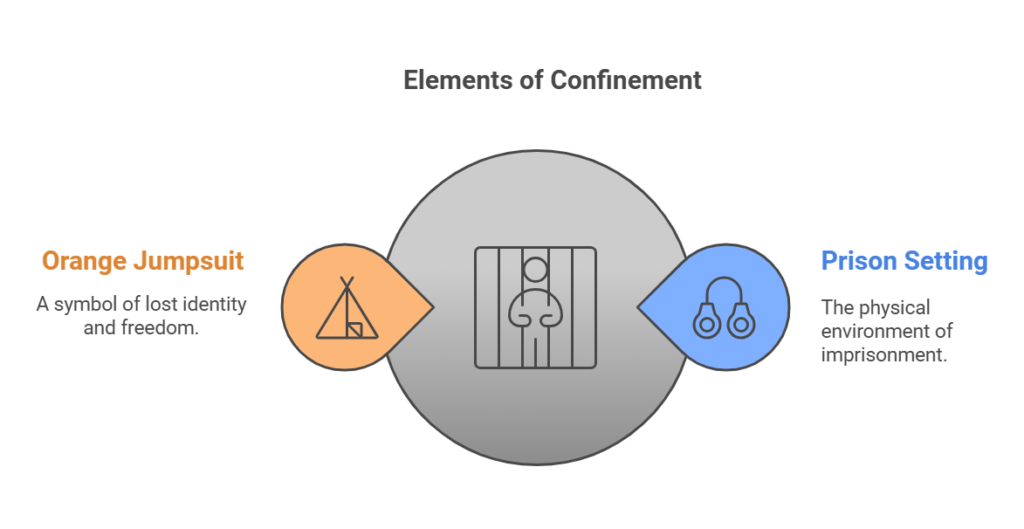
Nagasaki, 9 August 1945 (The Yet Unknowing World)
Set against the backdrop of Nagasaki on the day the U.S. dropped an atomic bomb, this section focuses on the relationship between Konrad Weiss, a German expatriate, and Hiroko Tanaka, a Japanese woman. As they navigate the changes brought on by the war, Hiroko, who works as a German translator, reflects on the transformation of Nagasaki and the strain of living under scrutiny due to her father’s past actions. The couple’s love must remain concealed as they face societal judgment—Konrad for his foreign status and Hiroko for her father’s perceived betrayal.
On the fateful day of August 9, both characters hear air raid sirens while in different locations. Konrad seeks shelter at Azalea Manor, where he meets Yoshi Watanabe, who has distanced himself from Konrad due to the changing political climate. Meanwhile, Hiroko finds herself in a crowded shelter filled with fear and hostility. Both hear news of a “new bomb” that had been dropped on Hiroshima just days before, highlighting the dire situation.
As the sirens signal an all-clear, Konrad and Hiroko reunite. Overcome with joy, Konrad proposes, but as they celebrate their engagement, disaster strikes: the atomic bomb devastates Nagasaki, leaving Hiroko severely injured and her father dying nearby, while Konrad perishes in the blast.
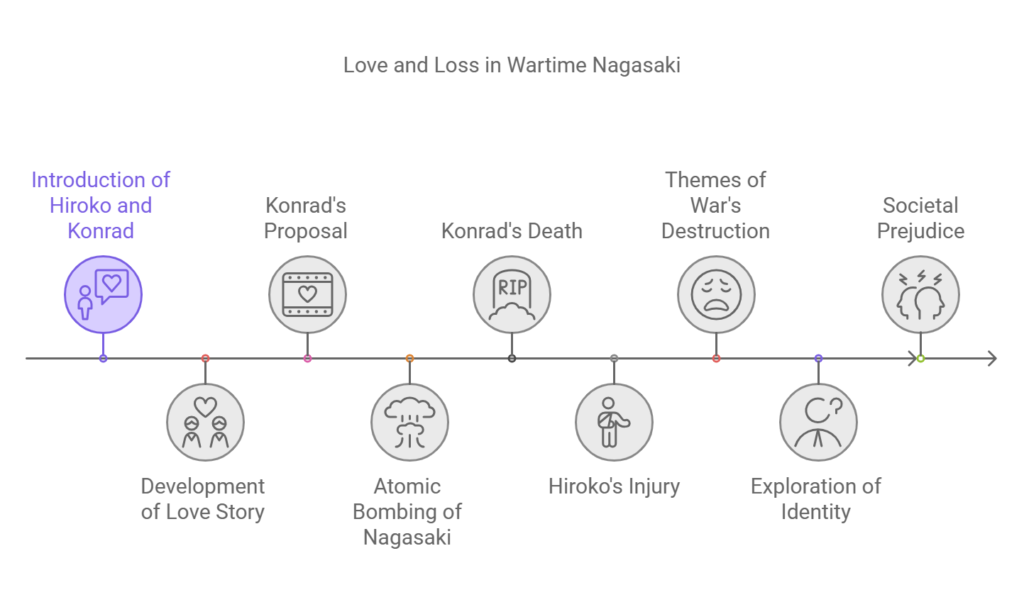
Delhi, 1947, Chapters 1-4 (Veiled Birds )
Two years later, Hiroko arrives in Delhi, where she encounters James Burton and his wife, Elizabeth (Konrad’s half-sister). Initially skeptical of Hiroko’s claims about her engagement to Konrad, the Burtons eventually offer her shelter. James, a lawyer, spends time playing chess with Sajjad Ali Ashraf, an aspiring lawyer from a local family. Sajjad’s family struggles to find him a suitable match amid the political unrest that followed the Partition of India, leading to tensions between modernity and tradition.
During her recovery from illness, Hiroko bonds with Elizabeth, sharing their grief over Konrad. As Hiroko learns Urdu from Sajjad, she recounts her traumatic experiences, revealing how the bomb’s aftermath continues to haunt her. At a party hosted by the Burtons, Hiroko feels both included and excluded among the English colonial settlers, echoing her dual identity as a survivor and an outsider.

Analysis
The opening section of Burnt Shadows establishes a crucial theme: the profound impact of war on individual lives and relationships. The narrative begins with the stark reality of Nagasaki in 1945, where the atomic bomb symbolizes not just physical destruction but also the shattering of personal connections and societal norms. Konrad’s reflection that “war fractures every view” encapsulates the emotional and psychological toll of conflict.
Hiroko’s desire for social norms to evolve alongside the destruction of the physical landscape highlights the persistent prejudices that exist even amidst catastrophe. Her status as the “traitor’s daughter” complicates her existence, revealing the societal reluctance to forgive and forget in the face of war’s aftermath. This societal lens emphasizes how identity is often constructed through political narratives and the legacies of past actions.
As the narrative transitions to post-war Delhi, the focus shifts to the British Raj and the dynamics of colonialism. James and Elizabeth Burton represent the colonizers who, while appearing to embrace inclusivity, remain oblivious to the inherent inequalities in their relationships with individuals like Sajjad. Their understanding of camaraderie is superficial; they fail to see the underlying power dynamics at play. Sajjad’s awareness of his position reflects a nuanced understanding of identity, wherein he navigates the complexities of belonging and exclusion.
The contrast between the gardens of Delhi and Dilli serves as a metaphor for the separation between colonizers and the colonized. Sajjad’s ability to appreciate both worlds highlights the necessity of transcending political labels to see individuals for who they are. Hiroko’s experience as an outsider in this setting underscores the enduring struggle to form connections across cultural and political divides.
As the narrative unfolds, the characters will be compelled to reassess their perceptions of one another, ultimately challenging the simplistic divisions created by nationality and politics. This theme resonates through their journeys, indicating that understanding and empathy are essential for overcoming the legacies of war and colonialism.
Summary and Analysis of Burnt Shadows, Part 2 (Veiled Birds, Chapters 5-12)
In this section of Burnt Shadows, Hiroko and Sajjad continue their Urdu lessons, deepening their understanding of each other. They discuss Konrad, who had visited Sajjad in Delhi years earlier. Meanwhile, tensions arise within the Burton family over whether their son, Harry, should return home from boarding school in England for the summer holidays. Despite having spent much of his childhood in Delhi, Harry’s English education creates a divide between his upbringing and his parents’ experiences.
Hiroko expresses a desire to see Sajjad’s “Dilli,” leading to a trip to Qutb Minar with the Burtons. However, James takes charge of the tour, leaving both Hiroko and Sajjad frustrated. Sajjad reflects on the English perspective toward India and their lack of connection to its history. The outing culminates in tension between Sajjad and the Burtons when Elizabeth alludes to Sajjad’s arranged marriage, causing Hiroko to storm off. The Burtons return home, leaving Sajjad behind.
The following day, Sajjad shares tea with Lala Buksh, the Burtons’ housekeeper, where they discuss rising Hindu-Muslim violence in India and Lala’s plans to move to Pakistan if the country is partitioned.
During a lesson, Hiroko confronts Sajjad about his marriage plans. He explains the uncertainty of his arranged marriage, and she expresses her belief that she connects more with Sajjad’s world than with the Burtons’. She reveals her scars from the atomic bomb, and their emotional exchange escalates into anger, leading to Hiroko’s outburst against Sajjad.
Elizabeth misinterprets the situation, believing Sajjad attempted to assault Hiroko. She fires him, and the Burtons decide to leave for their summer home in Mussoorie with Hiroko. They send Sajjad severance pay through Lala Buksh but do not apologize for their actions. Hiroko, feeling lost in Mussoorie, misses Sajjad, while Elizabeth believes the separation is for the best, as their worlds are too different.
Three months later, following his mother Khadija’s death, Sajjad struggles with familial obligations and the changing political landscape due to the British withdrawal and impending Partition. He expresses a desire to marry Hiroko, but his brothers’ pressures weigh heavily on him.
In Mussoorie, Sajjad confronts James, who attempts to apologize. Sajjad, feeling betrayed, refuses to accept it but indicates he wishes to speak to Hiroko. They discuss their potential future together, but Hiroko is hesitant about marrying due to her health concerns from the bomb. Sajjad encourages her to focus on the present instead of worrying about the future.
Ultimately, they decide to marry spontaneously, stealing a car from the Burtons and heading to a mosque, where Hiroko converts to Islam. After their marriage, James suggests they honeymoon in Istanbul to avoid the mounting political tensions in Delhi. However, when Sajjad learns at the Indian Consulate in Istanbul that his decision to leave India is irreversible, he faces an uncertain future.
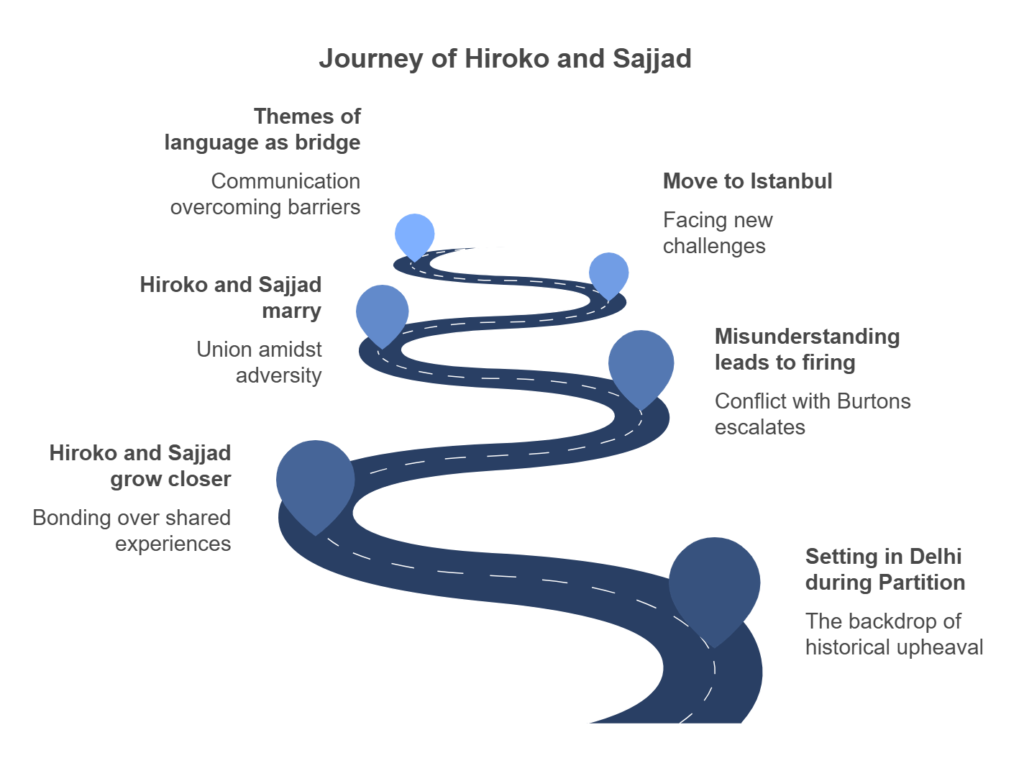
Analysis
In Burnt Shadows, language serves as a pivotal bridge between vastly different cultures, allowing Hiroko and Sajjad to connect despite their distinct backgrounds. Hiroko excels at learning languages, which fosters intimacy between her and others, as seen in her bond with Elizabeth and her growing relationship with Sajjad. The act of learning Urdu symbolizes the merging of their worlds, as Hiroko and Sajjad fall in love during their lessons.
The narrative highlights the colonial legacy and its impact on identity and belonging. Sajjad’s frustration grows as he realizes the Burtons’ detachment from Indian culture. When he serves as a guide at Qutb Minar, he recognizes the dissonance between their experiences—his “Dilli” versus their “Delhi.” Sajjad’s assertion that English colonizers have failed to assimilate into Indian culture emphasizes the anger stemming from colonial exploitation.
The Burtons’ actions toward Sajjad reveal a broader theme of mistrust and misunderstanding rooted in their colonial mindset. When they misinterpret the situation between Hiroko and Sajjad, it marks a point of no return for their relationship with him. Sajjad’s decision to sever ties with the Burtons symbolizes a rejection of the colonial power dynamics that have defined his existence.
Hiroko, as a figure caught between cultures, embodies the complexities of identity in a colonial context. Although she struggles to find her place, she recognizes shared cultural elements with Sajjad, stating that his world resembles her own Japanese traditions more than the Burtons’ world. This dynamic creates a new space for Hiroko and Sajjad to envision their future together amidst the political chaos.
The political unrest in India serves as both a backdrop and a catalyst for Sajjad and Hiroko’s relationship. Their eventual decision to marry reflects their desire to create a new world unbound by tradition or colonial dictates. However, it is also marked by loss and displacement, as Sajjad grapples with his sense of belonging amid the Partition.
Sajjad’s recognition that relationships have transformed into political categories illustrates the destructive effects of nationalism, pushing former neighbors into adversarial roles. As the story unfolds, the looming partition threatens to uproot the couple’s plans, leaving them with the painful reality that their love may not be enough to navigate the turbulent landscape of a newly divided India.
In summary, this section of Burnt Shadows delves into the intersections of language, identity, and political turmoil, exploring how love can emerge in a world fraught with division while highlighting the enduring impact of colonial history.
Burnt Shadows Summary and Analysis of Part 3 (Part-Angel Warriors, Chapters 13-22)
Part-Angel Warriors begins 35 years after the conclusion of Veiled Birds, set in Karachi, Pakistan. Hiroko and Sajjad have been married for three and a half decades, finding peace in their lives together. They have a sixteen-year-old son, Raza, who struggles with feelings of difference due to his Japanese heritage. While he has good relationships with his peers, Raza feels that his mother’s ethnicity sets him apart. Sajjad, working as a general manager at a soap factory, hopes Raza will follow in his footsteps and become a lawyer, fulfilling Sajjad’s own unrealized dreams.
As Raza approaches his final exams, Sajjad gifts him a cashmere jacket for their celebratory dinner. However, Raza fails his Islamic Studies exam, explaining that the questions seemed to shift as he began to answer. Hiroko comforts him, and they decide he can retake the exam in a few months.
The narrative shifts when Harry Burton, James and Elizabeth’s son, arrives in Karachi as a CIA operative under the guise of a consular officer. He visits Sajjad and Hiroko’s home, where he learns about Raza’s academic struggles. Raza’s friends start to distance themselves from him due to his failure, leaving him feeling isolated.
One morning, Harry and Sajjad go shopping at the fish harbor, leaving Raza asleep in the car. When he wakes, he meets Abdullah, a young Pashtun boy, and pretends to be Afghan. This interaction highlights Raza’s desire to fit in and the ease with which he adopts this false identity.
Meanwhile, Harry’s daughter, Kim, visits him and expresses her awareness of his CIA involvement. Harry reflects on his own immigrant identity and his idealistic motivations for joining the CIA.
Later, Hiroko, Sajjad, and Raza visit the beach, where Hiroko discusses Raza’s academic issues. Harry offers Raza advice on exams and the possibility of studying in the United States, reigniting Raza’s aspirations. However, when Raza calls his girlfriend, Salma, to share his plans, she dismisses his ambitions, emphasizing that her parents would not allow them to marry due to Hiroko’s past as a hibakusha.
When Harry visits for dinner, Raza reminds him of his promise to help him get into university. However, Harry backtracks on his assurances, which angers Sajjad, leading to a confrontation that results in Harry leaving the house. In a moment of frustration, Raza accidentally breaks his father’s tape recorder.
Seeking to replace it, Raza goes to Sohrab Goth, hoping to find Abdullah. He maintains his lie of being Hazara and expresses his desire to join the fight against the Soviets in Afghanistan. Raza’s sense of belonging grows as he forms a bond with Abdullah, leading to his decision to accompany Abdullah to mujahideen training camps. However, he quickly realizes the gravity of the situation when they arrive in an isolated area without any means of returning home.
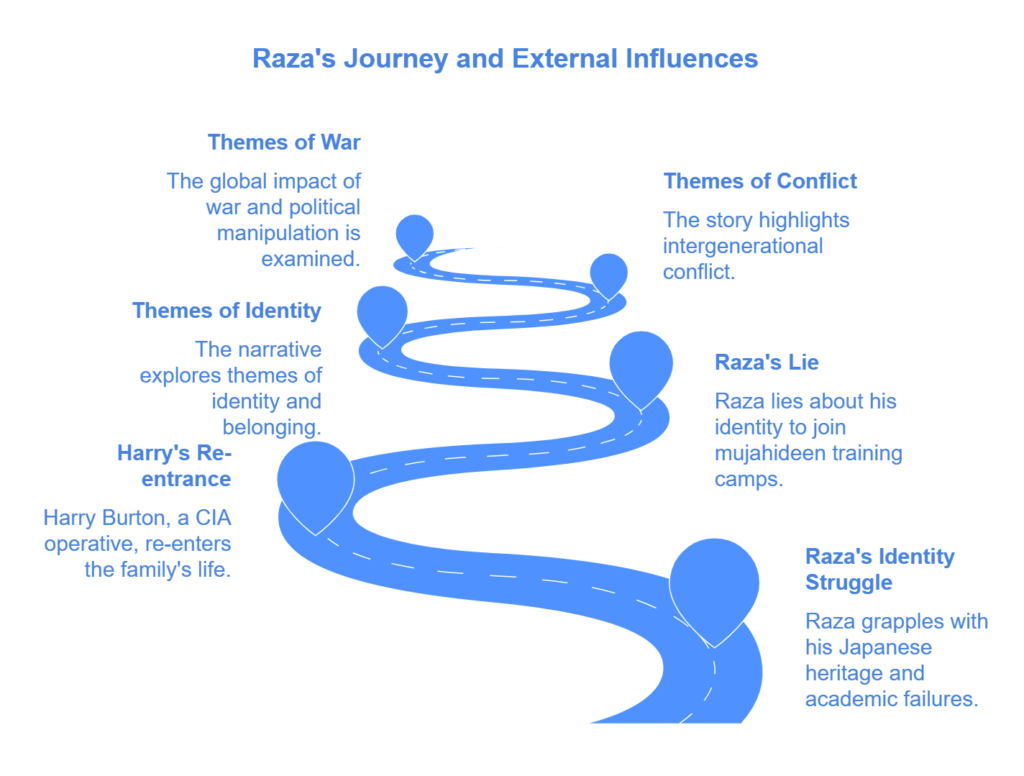
Analysis
In this section of Burnt Shadows, the theme of difference emerges through the experiences of Hiroko and her son, Raza. While Hiroko and Sajjad have established a life in Karachi, Hiroko’s foreignness makes her an outsider, despite her strong community ties. Initially, Sajjad believes Hiroko will be welcomed by their neighbors if she adapts to their customs, while Hiroko asserts the importance of acceptance on her own terms. Although she does not conform to local attire, her role as a schoolteacher earns her acceptance, showcasing how community bonds can transcend cultural differences.
Hiroko embraces her outsider status, feeling at home in her foreignness and resisting the concept of national identity. This acceptance contrasts sharply with Raza’s feelings of alienation, which stem from both his mother’s Japanese heritage and the stigma associated with being a hibakusha. His longing for assimilation leads him to question his mother’s identity, demonstrating the internal conflict he faces as he grapples with his mixed heritage.
Raza’s experiences amplify his sense of difference, particularly after his repeated academic failures, which contribute to his feelings of inadequacy. He struggles to fit in with his peers, leading him to develop a “studied awareness” to navigate social dynamics. The label of being a hibakusha further complicates his search for acceptance, as he fears the impact of his heritage on his prospects for marriage and social belonging.
In contrast, Raza finds a sense of belonging within the Afghan immigrant community. By lying about his identity, he gains acceptance among the Afghans, and this falsehood provides him with a newfound sense of empowerment. This transformation into “Raza Hazara” symbolizes his desire to escape his reality and embrace a different narrative, albeit at a significant cost. The moment he holds an AK-47 while identifying with Abdullah underscores his yearning for agency and belonging.
The political backdrop of Part-Angel Warriors reflects the socio-political changes occurring in Pakistan and Afghanistan during the 1980s. Hiroko’s unease with the rise of religious nationalism parallels her concerns about the implications of political Islam on women’s rights and social dynamics. Her memories of wartime Japan resonate as she observes the increasing enforcement of religious codes, which further alienates her from the culture she inhabits.
Harry’s character introduces the theme of American imperialism and its intersection with the geopolitical landscape of the time. As a CIA operative, he embodies American ideals of freedom and opportunity, contrasting with the complexities of identity that Raza faces. Harry’s belief in America as a land of acceptance stands in stark contrast to the realities of xenophobia and suspicion that emerge in a post-9/11 context.
Overall, Part-Angel Warriors explores the interplay of identity, belonging, and the impact of political turmoil on personal lives. Raza’s journey reflects the complexities of navigating cultural differences and the quest for self-definition against the backdrop of familial expectations and societal pressures.
Summary and Analysis of Part 4 (Part-Angel Warriors ch. 23-6, The Speed Necessary to Replace Loss ch. 27-32)
Hiroko is alarmed by the silence in her home and discovers a note from Raza stating that he has gone on a trip with friends. Despite Sajjad’s reassurance, Hiroko is worried about his whereabouts. She visits her neighbor Qaisra, who provides comfort, but later learns from Salma that Raza has actually escaped to a mujahideen training camp. This revelation sheds light on Raza’s recent behavior, particularly his newfound interest in Afghanistan. Sajjad vows to find their son.
Meanwhile, Raza and his friend Abdullah embark on their journey to the training camp, guided by Abdullah’s older brother. After an arduous hike, they arrive at the camp, where Raza feels homesick and frightened. His exhaustion overwhelms him, causing him to collapse. After a man wakes him, Raza participates in a prayer session with the other recruits, feeling a deep connection to his faith for the first time, and identifying himself as Raza Hazara.
Abdullah later confesses to Raza that he may have inadvertently revealed too much to the camp commander, who becomes suspicious of Raza’s background, fearing he might be a CIA spy due to his connection to Harry Burton. As a result, the commander plans to send Raza back home, which he secretly welcomes.
On the home front, Sajjad desperately searches for Raza. While at the fish market, he encounters Harry’s driver, Sher Mohammed, who, fearful of being exposed as a CIA operative, shoots Sajjad during their encounter.
When Raza returns home, he finds his mother mourning Sajjad’s death. Raza blames Harry for his father’s demise, but Hiroko asks Harry to leave in distress.
New York, Afghanistan, 2001-2 (The Speed Necessary to Replace Loss)
Set 18 years after Sajjad’s death and three months after the September 11 attacks, this section follows Hiroko as she moves to New York to live with Elizabeth. Kim is visiting her grandmother and plans to relocate back to NYC from Seattle. Raza and Harry work together as private contractors for the U.S. government, conducting covert operations in Afghanistan as part of the War on Terror.
The impact of 9/11 weighs heavily on Kim, who feels disoriented by the event. As a structural engineer, she grapples with the idea that buildings cannot be made impervious to such disasters. Hiroko fears a nuclear confrontation between India and Pakistan but feels less panicked than Kim. Their differing perspectives reflect their personal experiences of crisis.
In Afghanistan, Raza steals a Humvee and travels to the Pakistani border, meeting with his cousin Sajjad, who serves as a captain in the army. Raza seeks information about Abdullah but receives only a contact number for the training camp’s commander. Hearing a call to prayer en route home, Raza stops to pray, only to be noticed by an American helicopter.
Later, Elizabeth passes away, prompting Harry to return to NYC to support Kim during her grief. Kim confronts Harry about his prolonged absence, while Hiroko questions him about the political situation in South Asia. They bond over shared memories, including familiar fruits from Delhi.
During a special mission, Harry’s colleague Steve expresses distrust towards Raza due to his faith, questioning whether Raza’s religion should be a concern. Harry defends Raza, but Steve’s apprehension reflects a broader suspicion towards Muslims post-9/11.
Raza seeks to reconnect with Abdullah, feeling remorse for having encouraged him to join the training camp years earlier.
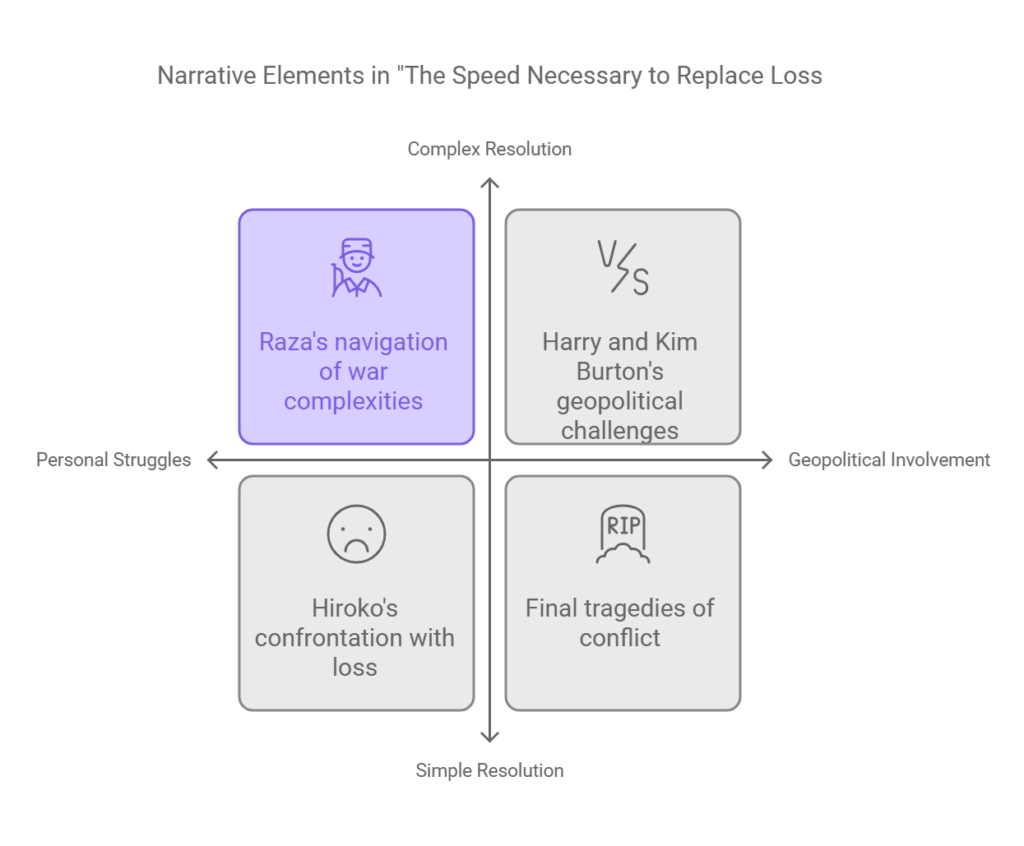
Analysis
The transition from “Part-Angel Warriors” to “The Speed Necessary to Replace Loss” signifies a profound transformation in Raza’s character. Initially, Raza finds satisfaction in concealing his identity, but upon arriving at the training camp, he becomes acutely aware of the weight of his deception. He grapples with feelings of self-disgust, reflecting on the implications of his choices: “Raza watched the grimy train window reflecting a face which he looked at with honest distaste” (239). The aftermath of his father’s death and his abandonment of Abdullah push Raza into a morally ambiguous position, where he ultimately works for the U.S. government, a stark departure from his earlier values.
Raza’s encounter with faith at the training camp also marks a significant shift. Participating in the communal prayers evokes a genuine sense of spirituality, transforming him into Raza Hazara. This moment illustrates how his identity evolves, melding his cultural heritage with newfound religious conviction. His experience is juxtaposed with Sajjad’s desperate prayers for his son’s safety, highlighting a shared yet distinct relationship with faith in the face of uncertainty.
The novel also critiques the American tendency to homogenize Muslim identities, particularly after 9/11. Steve’s distrust of Raza, despite Harry’s support, emphasizes the broader societal prejudices that emerge in response to terrorism. The characters’ responses to the September 11 attacks reveal the individual versus national experience dynamic. Kim’s overwhelming sense of loss contrasts with Hiroko’s recognition that global tragedies are not confined to a singular event, reinforcing a nuanced understanding of crisis.
Hiroko’s volunteer work at Ground Zero represents an attempt to connect with the American community, but she becomes disillusioned by the rampant nationalism that arises. Her realization that immigrants are often overlooked in discussions of patriotism adds a layer of complexity to the narrative.
Ultimately, “Burnt Shadows” weaves together personal and political identities, illustrating the struggle for connection amidst external conflicts. The enduring bond between the Burton and Ashraf families underscores the importance of individual relationships transcending national boundaries, offering a poignant commentary on the human experience in times of political turmoil. The interplay of identity, faith, and collective memory culminates in a rich tapestry that resonates throughout the narrative, culminating in Kim’s actions in the final section.